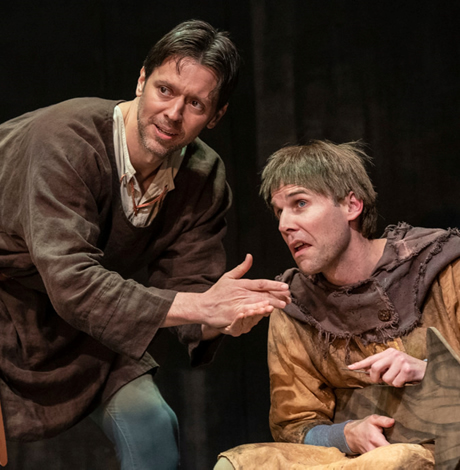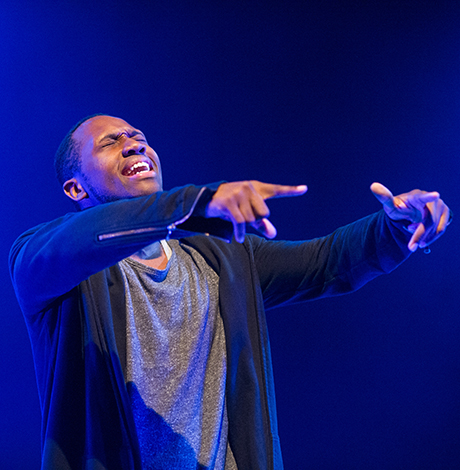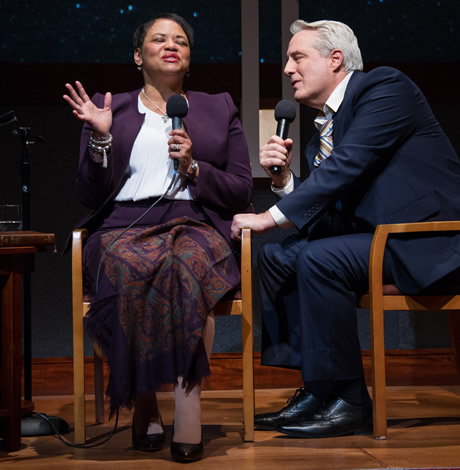Arts & Entertainment
Maps and memories
‘Planet’ production explores fear and isolation among gay men
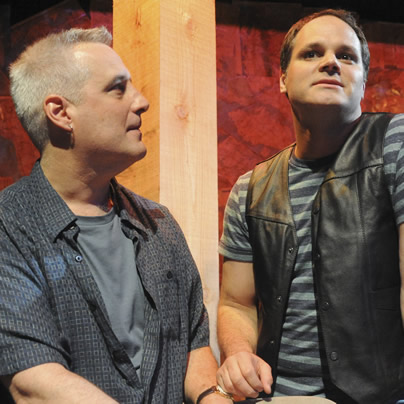
‘Lonely Planet’
Through June 17
MetroStage
1201 N. Royal St., Alexandria
$45-$50 (military and student discounts available)
703-548-9044
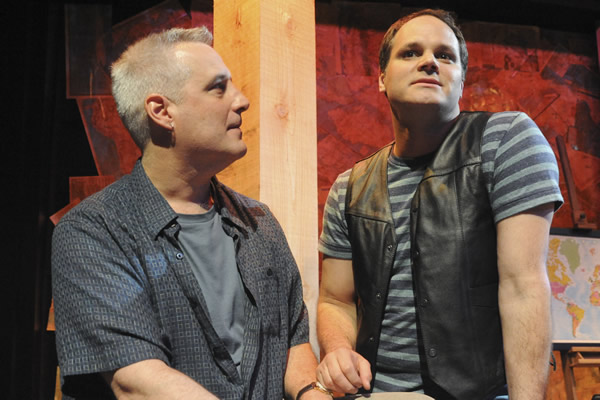
Michael Russotto, left, and Eric Sutton in ‘Lonely Planet’ by playwright Steven Dietz. (Photo by Christopher Banks; courtesy MetroStage)
Tucked away inside his tidy map shop, Jody does his best to keep the uncertainties of the turbulent outside world at bay. But his is an unwinnable strategy. Sooner or later, he must confront what terrifies him most.
In Steven Dietz’s 1994 play “Lonely Planet” — currently playing at MetroStage in Alexandria — the playwright describes a plague that’s affecting men in an American city, and though he doesn’t refer to the disease by name, it’s never for a moment in doubt that the culprit is AIDS. Inspired by maps and Ionesco’s absurdist play “The Chairs,” Dietz explores death and friendship during the most harrowing time of the crisis.
The action is restricted to one space: a small, carefully appointed shop. Here, gay middle-aged Jody (Michael Russotto) has constructed an orderly sanctuary where he deals exclusively with the exactness of latitude and longitude, a place where sales are occasionally referred to, but customers are never seen. We do, however, see Carl (Eric Sutton), a gay younger friend who frequently visits bearing irony and chairs (ladder back, rocker, Windsor) which he persuades Jody to store for him because his apartment is too small. After spinning a tale or two and delivering a pep talk on getting out and about, Carl dashes off to one of his invented jobs (tabloid reporter, art conservator, auto glazier) only to return minutes later with more chairs and chatter.
Soon we learn that Carl’s ever-increasing hoard of chairs once belonged to his and Jody’s friends who have died in the frighteningly lethal epidemic. Carl keeps one chair belonging to each victim as a remembrance. It’s also revealed that Carl’s true employment involves clearing out the homes of these recently deceased friends. And those made-up jobs? They also belonged to the dearly departed.
After intermission, the stage is lit to reveal even more chairs (straw bottomed, barber, Breuer). The image gets a chuckle from the audience, but they’re a terrifying reminder to Jody of death, disease and the uncertainty of his HIV status (Jody has yet to be tested). His fear is palpable. It’s up to Carl to coax Jody to venture beyond the store.
Set designer Jane Fink has imagined a shop filled with globes and scrolled maps. Its heavy dark furniture and transom door feel entirely resistant to time. The stage is backed by a wall of collaged maps. At the top of a simple proscenium is the earth as photographed from outer space. By the show’s end, dozens of chairs are piled on the stage, creating a tall and odd monument. Sounds questionable, but it proves exceedingly poignant.
As Jody and Carl, Russotto and Sutton, respectively (both actors are gay), are believable as longtime, caring friends and each do their best to elevate sometimes plodding monologues. Russotto’s performance is deceptive — it’s quiet but packs an emotional wallop. And Sutton is delightful as the vexing, leather vest-wearing Carl whose sarcasm can belie his good heartedness.
Despite the sad subject matter, much of “Lonely Planet” is playful and fun. And while the allegorical and symbolic aspects of the show can get a little heavy handed, skilled director John Vreeke (also gay) guides the actors in creating some glowing, touching moments. And Vreeke (with the help of lighting designer Jessica Lee Winfield) stages the unexpected and very memorable ending just right.
At a recent performance, the audience was comprised mostly of midshipmen from the Naval Academy’s drama group, the Masqueraders. It struck others present that these young men and women were toddlers when the play was penned almost 20 years ago. Through “Lonely Planet,” they traveled to a time when testing positive was a death sentence, but they were also shown a glimpse of the gay community at its very best and the enduring value of friendship.

Team DC, the umbrella organization for LGBTQ-friendly sports teams and leagues in the D.C. area, held its annual Night of Champions Awards Gala on Saturday, April 20 at the Hilton National Mall. The organization gave out scholarships to area LGBTQ student athletes as well as awards to the Different Drummers, Kelly Laczko of Duplex Diner, Stacy Smith of the Edmund Burke School, Bryan Frank of Triout, JC Adams of DCG Basketball and the DC Gay Flag Football League.
(Washington Blade photos by Michael Key)




















The 2024 National Cannabis Festival was held at the Fields at RFK Stadium on April 19-20.
(Washington Blade photos by Michael Key)
















Covering the @NatlCannaFest at RFK Stadium for @WashBlade . Stop by the LGBTQ+ booth and pick up a paper if you are here. pic.twitter.com/is7hnsaPns
— Michael Patrick Key (@MichaelKeyWB) April 20, 2024
Theater
‘Amm(i)gone’ explores family, queerness, and faith
A ‘fully autobiographical’ work from out artist Adil Mansoor

‘Amm(i)gone’
Thorough May 12
Woolly Mammoth Theatre
641 D St., N.W.
$60-$70
Woollymammoth.net
“Fully and utterly autobiographical.” That’s how Adil Mansoor describes “Amm(i)gone,” his one-man work currently playing at Woolly Mammoth Theatre.
Both created and performed by out artist Mansoor, it’s his story about inviting his Pakistani mother to translate Sophocles’s Greek tragedy “Antigone” into Urdu. Throughout the journey, there’s an exploration of family, queerness, and faith,as well as references to teachings from the Quran, and audio conversations with his Muslim mother.
Mansoor, 38, grew up in the suburbs of Chicago and is now based in Pittsburgh where he’s a busy theater maker. He’s also the founding member of Pittsburgh’s Hatch Arts Collective and the former artistic director of Dreams of Hope, an LGBTQ youth arts organization.
WASHINGTON BLADE: What spurred you to create “Amm(i)gone”?
ADIL MANSOOR: I was reading a translation of “Antigone” a few years back and found myself emotionally overwhelmed. A Theban princess buries her brother knowing it will cost her, her own life. It’s about a person for whom all aspirations are in the afterlife. And what does that do to the living when all of your hopes and dreams have to be reserved for the afterlife?
I found grant funding to pay my mom to do the translation. I wanted to engage in learning. I wanted to share theater but especially this ancient tragedy. My mother appreciated the characters were struggling between loving one another and their beliefs.
BLADE: Are you more director than actor?
MANSOOR: I’m primarily a director with an MFA in directing from Carnegie Mellon. I wrote, directed, and performed in this show, and had been working on it for four years. I’ve done different versions including Zoom. Woolly’s is a new production with the same team who’ve been involved since the beginning.
I love solo performance. I’ve produced and now teach solo performance and believe in its power. And I definitely lean toward “performance” and I haven’t “acted” since I was in college. I feel good on stage. I was a tour guide and do a lot of public speaking. I enjoy the attention.
BLADE: Describe your mom.
MANSOOR: My mom is a wonderfully devout Muslim, single mother, social worker who discovered my queerness on Google. And she prays for me.
She and I are similar, the way we look at things, the way we laugh. But different too. And those are among the questions I ask in this show. Our relationship is both beautiful and complicated.
BLADE: So, you weren’t exactly hiding your sexuality?
MANSOOR: In my mid-20s, I took time to talk with friends about our being queer with relation to our careers. My sexuality is essential to the work. As the artistic director at Dreams of Hope, part of the work was to model what it means to be public. If I’m in a room with queer and trans teenagers, part of what I’m doing is modeling queer adulthood. The way they see me in the world is part of what I’m putting out there. And I want that to be expansive and full.
So much of my work involves fundraising and being a face in schools. Being out is about making safe space for queer young folks.
BLADE: Have you encountered much Islamophobia?
MANSOOR: When 9/11 happened, I was a sophomore in high school, so yes. I faced a lot then and now. I’ve been egged on the street in the last four months. I see it in the classroom. It shows up in all sorts of ways.
BLADE: What prompted you to lead your creative life in Pittsburgh?
MANSOOR: I’ve been here for 14 years. I breathe with ease in Pittsburgh. The hills and the valleys and the rust of the city do something to me. It’s beautiful, it’ affordable, and there is support for local artists. There’s a lot of opportunity.
Still, the plan was to move to New York in September of 2020 but that was cancelled. Then the pandemic showed me that I could live in Pittsburgh and still have a nationally viable career.
BLADE: What are you trying to achieve with “Amm(i)gone”?
MANSOOR: What I’m sharing in the show is so very specific but I hear people from other backgrounds say I totally see my mom in that. My partner is Catholic and we share so much in relation to this.
I hope the work is embracing the fullness of queerness and how means so many things. And I hope the show makes audiences want to call their parents or squeeze their partners.

